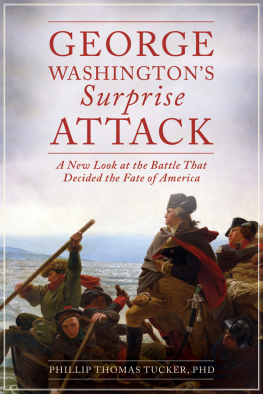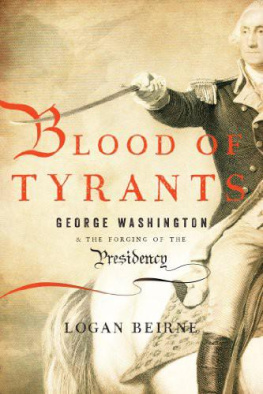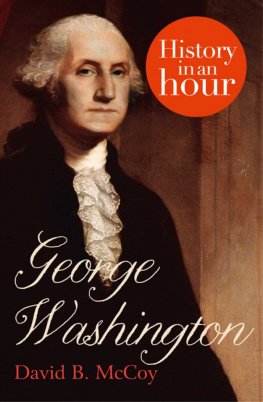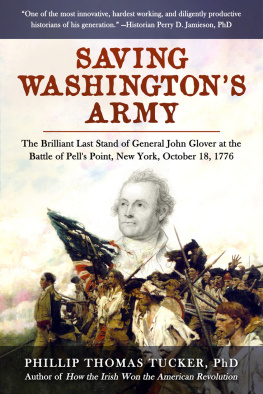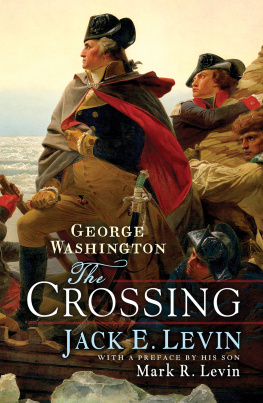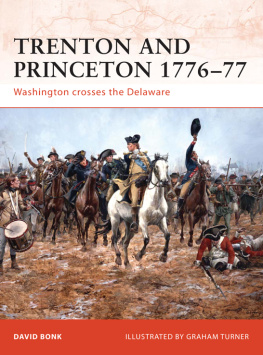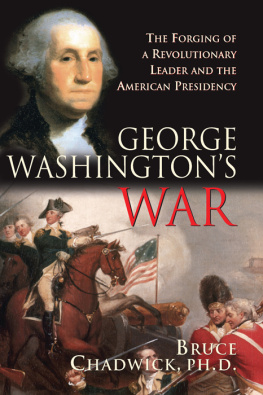Copyright 2014 by Phillip Thomas Tucker
All Rights Reserved. No part of this book may be reproduced in any manner without the express written consent of the publisher, except in the case of brief excerpts in critical reviews or articles. All inquiries should be addressed to Skyhorse Publishing, 307 West 36th Street, 11th Floor, New York, NY 10018.
Skyhorse Publishing books may be purchased in bulk at special discounts for sales promotion, corporate gifts, fund-raising, or educational purposes. Special editions can also be created to specifications. For details, contact the Special Sales Department, Skyhorse Publishing, 307 West 36th Street, 11th Floor, New York, NY 10018or .
Skyhorse and Skyhorse Publishing are registered trademarks of Skyhorse Publishing, Inc., a Delaware corporation.
Visit our website at www.skyhorsepublishing.com.
10 9 8 7 6 5 4 3 2 1
Library of Congress Cataloging-in-Publication Data
Tucker, Phillip Thomas, 1953
George Washingtons surprise attack : a new look at the battle that decided the fate of America / by Phillip Thomas Tucker, PhD.
pages cm
ISBN 978-1-62873-652-6 (alk. paper)
1. Trenton, Battle of, Trenton, N.J., 1776. 2. Washington, George, 1732-1799Military leadership. I. Title.
E241.T7T83 2014
973.332dc23
2013047083
ISBN: 978-1-62873-652-6
Printed in the United States of America
Dedication:
To my father, Willard Thomas Tucker, 1924-2013.
He Inspired This Work In Too Many Ways To Count.
Most Of All, His Guiding Hand, Sage Advice, and Inspirational Influence
Made This Book Possible. As A True American Patriot, He Sincerely Believed
In The Inspirational Value And Importance Of This Work For Todays America.



Contents
Introduction
After securing victory at Yorktown, Virginia, in October 1781, with his soldiers of liberty and the troops of Americas French ally, George Washington was celebrated as Americas greatest conquering hero when he arrived with much fanfare in the prosperous Maryland state capital of Annapolis. Here, thankful city fathers, representing the American peoples exuberance, presented a stirring city address to General Washington. However, they focused not on the recent Yorktown success, but on Washingtons sparkling victory at Trenton, New Jersey, more than five years before. Emphasizing how Washingtons December 26, 1776 miracle victory saved the revolution from an early death, the esteemed civic leaders of Annapolis declared, We derive peculiar pleasure from the contemplation, that the successes [of Washington and his Continental Army] at Trenton and Princeton laid the corner stone of our freedom and independence.
Articulating the sentiments of the American people, these heartfelt words of the Annapolis elite were right on target. Before Washington won his most improbable victory at Trenton on the snowy, bitterly cold morning of December 26, 1776, only a military miracle could have possibly saved the unprecedented egalitarian dream of America, a common peoples revolution, and an audacious republican experiment. After having suffered one sharp military setback after another for months during Americas darkest year of 1776, when the once-vibrant dream of nationhood had all but succumbed to an early, agonizing death, everything now depended upon a forty-five-year old former Virginia militia commander, who had yet to win a single battle in Americas struggle for liberty after nearly a year and a half. Washingtons military reputation and career lay in ruins. After the panicked members of the Continental Congress fled the new republics capital of Philadelphia and with the British-Hessian Army drawing ever closer in early December, Washington was left with the sole responsibility to somehow do the impossible.
Therefore, the irrepressible Virginian, who proved to be at his best exactly when Americas fortunes had fallen to their lowest ebb, took the greatest risk and gamble of his career. He decided to go for broke when the stakes could not have been higher for America. On Christmas night, which appeared to be the final Yuletide of the infant republics short lifetime and a failed experiment in nationhood, Washington prepared to lead a stalwart band of ill-clad, often-defeated band of revolutionaries from across America into the cold depths of the black unknown east of the Delaware River in a desperate bid to preserve a new, shining future for America.
Embarking upon what no one of either side imagined any sane military leader would attempt to even think about in the midst of winters tight grip when eighteenth-century armies traditionally remained quietly in winter quarters, Washington sought to reverse the fortunes of war on one throw of the dice in what was literally Americas last opportunity to do so. With Continental enlistments of almost all of his best troops about to expire at the years end, Washington had little choice but to stake everything on his surprise attack on the Trenton garrison of the best professional soldiers in America, the Hessians.
By this time, Americas resistance effort had fizzled miserably after a string of summer and autumn disasters. Without a late December victory from Americas rustic revolutionaries, this struggle for Americas possession, heart, and soul was over. If Washington lost the next battle, then the young American republic was fated to become nothing more than only an obscure footnote in history books. Washington fully realized that if he and what little remained of his Continental Army suffered yet another defeat during Americas darkest hour, then the young American republic and dream was forever doomed to an ignominious end.
Consequently, undertaking what was truly a mission impossible, Washington planned to cross the swollen, ice-clogged Delaware River (like Julius Caesar who ferried his legionnaires across wide rivers to surprise his opponents in winters depths) from eastern Pennsylvania to western New Jersey, conduct a lengthy night march south through uncharted territory to descend upon Trenton from the north, assault three veteran regiments (a full Hessian brigade) of well-trained troops, and capture the suddenly strategic Delaware river town of Trenton.
Quite simply, what Washington planned to embark upon was the most audacious offensive effort of the war. Because actual independence could only be achieved by winning victory on the battlefield, Americas true creation story actually began not with the signing of the Declaration of Independenceof but little importance without military victory in Thomas Paines insightful wordsat Philadelphia, Pennsylvania, on July 4, 1776, but at Trenton on December 26, 1776 with the most improbable victory of the American Revolution. When the idealistic dream of a new peoples republic had been transformed into a nightmare by early December 1776, the fortunes of war were miraculously reversed by Washington in what was his finest hour.
Clearly, the high-stakes showdown at Trenton was far more than the story of a typical battle of wasteful bloodletting because Americas independence had to be won by the flintlock muskets and rifles of Washingtons rough-hewn, illiterate common soldiersmostly farmers and huntersrather than by the pen of the erudite, aristocratic members of the well-educated colonial elite in Philadelphia. Therefore, this all-important clash of arms in the harsh environment of a swirling snowstorm resulted in the American Revolutions most dramatic reversal of fortunes in which the United States of America was truly born. With his one-sided December 26 success validating Jeffersons words in the Declaration of Independence, Washingtons unexpected victory at Trenton earned a new lease of life for the American republic because the declarations signing had been only a stillbirth that was more rhetorical, if not fanciful, than real. Therefore, Washingtons victory at Trenton was in fact Americas true creation story, rebirth, and original national Illiad.

